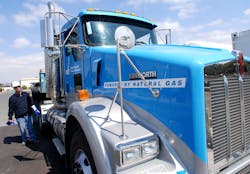Adapting fuel cards to the alternative-fuel world
As natural gas and other alternative fuels begin to get a more in-depth look from the trucking industry, fuel card programs are being adapted to handle them as well, according to interviews with both fleet operators and fuel card providers.
“We are currently used by fleets to purchase many types of alternative fuels such as LNG [liquefied natural gas], CNG [compressed natural gas], propane, even for DEF [diesel exhaust fluid],” Randy Morgan, executive vp-- fleet for Comdata, told Fleet Owner.
“Our philosophy is that it doesn’t matter where the fleet purchases fuel – retail, mobile re-fuelers, or at their own terminals – or what type of fuel they purchase, be it gasoline, diesel, CNG, LNG, or propane,” he added. “We have a comprehensive solution allowing them to account for all fuel spend with one system and one card.”
“Many of the latest generation dispensing systems for alternative fuels such as natural gas are configured to accept most standard fuel cards,” noted Scott Perry, vp of purchasing/supplier management for Ryder System.
“We will likely see a conversion to the best available transaction management technology in those products, as those stations are being newly built where the costs of converting to new dispensers is much lower than retrofitting dispensers and systems that are already in place,” he pointed out.
Drew Cullen, vp--- fuels & telecommunications for Penske Truck Leasing, emphasizes that the technology exists today to allow for the management of natural gas and other alternative fuels via fuel cards and that as the adoption rate and fueling infrastructure increases, fleets will be able to use many of the fuel management strategies they implemented for petroleum-based fuels.
“Alternative fuels will undoubtedly be part of any change to the way fuel is purchased on the fleet level,” echoed Mark Wallin, VP-product management for Telogis. “Whether companies decide on a gasoline or alternative fuel strategy will ultimately be irrelevant, as fuel management programs have to be flexible and scalable enough to handle whatever companies decide is right for them.
He believes that in the near-future the use of what he calls “open location intelligence platforms” that provide a “true 360-degree visibility” into fuel use will be bets – if not only—pathway for fleets to follow.
“Our goal is to give customers the ability to integrate dynamic routing, advanced diagnostics and telematics, mobile solutions and applications, commercial navigation and real-time work order management all in one place – one dashboard – so that companies can get a better grip on what type and where fuel is being used, and really begin to manage their fuel spend,” he explained.
About the Author
Sean Kilcarr
Editor in Chief
Sean Kilcarr is a former longtime FleetOwner senior editor who wrote for the publication from 2000 to 2018. He served as editor-in-chief from 2017 to 2018.
